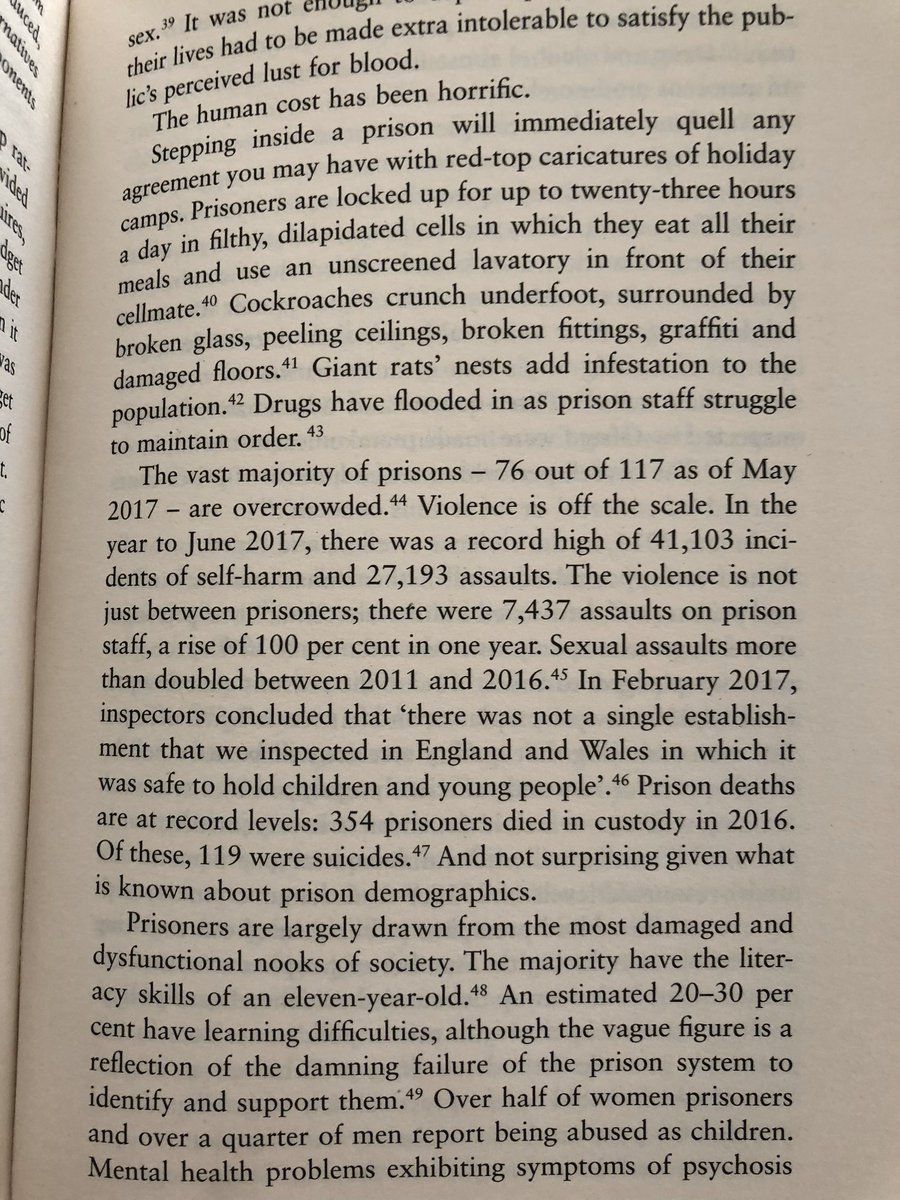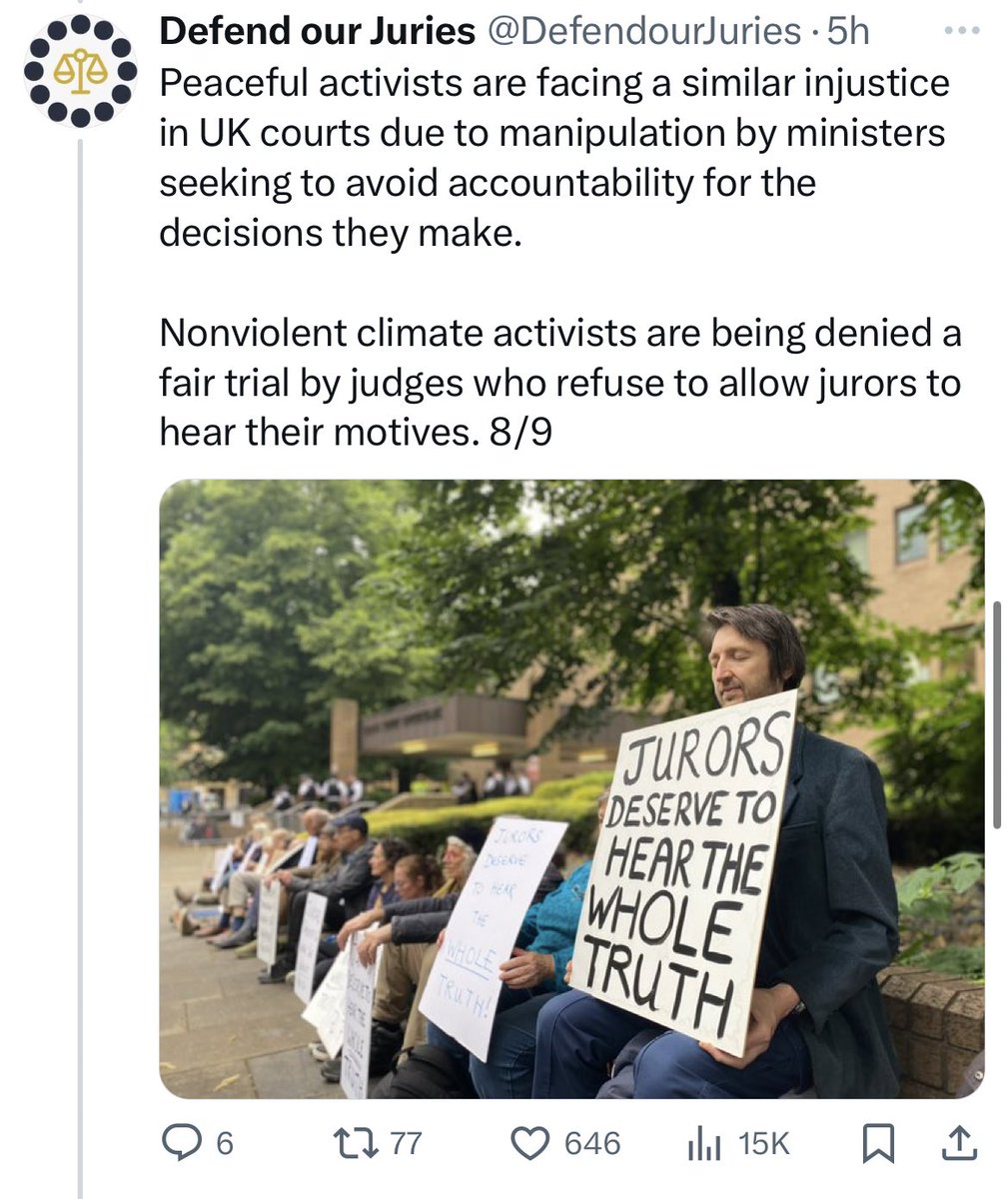“Seeing justice truly done” is an interesting soundbite.
Is it, as this incoherent, sub-sixth-form essay rant suggests, only about locking more people up for longer?
Or does “justice truly done” mean a little more?
[THREAD]
Is it, as this incoherent, sub-sixth-form essay rant suggests, only about locking more people up for longer?
Or does “justice truly done” mean a little more?
[THREAD]
https://twitter.com/bbcnews/status/1304894436002934788
Justice truly done means people not being forced to wait years for trials due to the government’s long-term refusal to resource the courts, which has caused a huge backlog (that they are falsely trying to blame on Covid). lawgazette.co.uk/news/new-figur…
Justice truly done means abolishing the Innocence Tax, by which the government refuses you legal aid, forces you to pay privately for your legal defence team and then, when you’re acquitted, refuses to reimburse you, leaving you penniless. thetimes.co.uk/article/ditch-…
Justice truly done means stopping selling off the courts. Over 150 courts have been closed down since 2010. Some people - defendants, witnesses, victims - now have to endure a 5-hour round trip on public transport to reach their “local” court. thetimes.co.uk/article/court-…
Justice truly done means making courts that are still open fit for human use. Basics such as running water, working lifts, non-leaking roofs, heating & functioning toilets don’t exist in many courts, left to rot by ministers who don’t have to visit them. ft.com/content/88b5f3…
Justice truly done means stopping the abuse of “Release Under Investigation” (RUI), brought in after the govt changed the laws on police bail to win cheap headlines. RUI sees suspects released for years while investigations plod at a snail’s pace. lawgazette.co.uk/news/police-fi…
Justice truly done means funding digital forensic investigation units so that it does not take over 12 months to examine a mobile phone, which causes enormous delays before files can even be sent to the Crown Prosecution Service for a charging decision. policeprofessional.com/news/forensic-…
Justice truly done means reversing the c£1bn cut to prisons that has resulted in dangerous understaffing & overcrowding, a collapse in training and education, record violence and self-harm, rampant drug abuse, infestation and “not a single establishment safe to hold children.” 



Justice truly done means finding the £195m required to fund Rape Crisis Centres properly so that thousands of survivors don’t find themselves cut adrift with no support rapecrisis.org.uk/news/latest-ne…
Justice truly done means addressing the problems that followed the government’s closure of the Forensic Science Service in 2012, which led to private providers and police laboratories failing to meet basic standards, jeopardising criminal investigations. bbc.co.uk/news/uk-385278…
Justice truly done means comprehensively reviewing the magistrates’ court system, which hands unqualified volunteers the power to send the rest of us to prison for up to a year, in conditions of sausage factory justice.
Justice truly done means reversing the debilitating funding cuts to the Criminal Cases Review Commission, the statutory body responsible for investigating miscarriages of justice. theguardian.com/law/2018/sep/0…
Justice truly done means reversing the cuts to youth services (up to 91% in some local authorities) which the All Party Parliamentary Group on Knife Crime suggested are linked to the increase in knife crime. bbc.co.uk/news/uk-481763…
Justice truly done means addressing mental health provision. The criminal justice system, and especially prisons, are crammed with people who should not be there. Criminal justice does not exist in a vacuum. The whole system must do better. justice.org.uk/people-mental-…
Justice truly done means improving understanding of the criminal justice system through public legal education. And ensuring that as PM you don’t worsen the problem by spreading #FakeLaw. Speak truth. Even if you have to plagiarise a legal blogger to do it newsweek.com/boris-johnson-…
Justice truly done requires honesty about where the problems in criminal justice lie.
It means not treating the public like fools by pretending that criminal justice is nothing more than longer prison sentences.
Justice is so much more.
Don’t let them lie to you.
#FakeLaw
It means not treating the public like fools by pretending that criminal justice is nothing more than longer prison sentences.
Justice is so much more.
Don’t let them lie to you.
#FakeLaw
• • •
Missing some Tweet in this thread? You can try to
force a refresh









